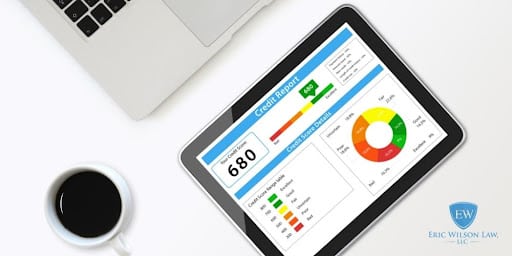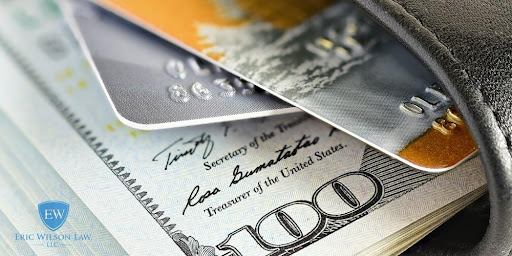How To Fix Your Credit Report
Crippling debt and credit reports – they often go hand in hand. If you’re struggling to dispute credit report errors, get an auto loan, save money on certain types of insurance, or gain approval for lower credit card interest rates all because of your credit score, the legal team at Eric Wilson Law can help. We are a full-service consumer law firm and debt relief agency in Tuscaloosa, AL that’s passionate about helping people regain control of their finances. Oftentimes, gaining financial control means learning how to fix your credit score fast. For more information on how we can help you, call 205-349-1280 today.

What is the Credit Repair Organizations Act (CROA)?
Before we get into exactly how to fix your credit, it’s important to know that you can do the majority of the “fixing” yourself. In fact, the Credit Repair Organizations Act (CROA) was created to protect people like you from credit repair companies that offer services bordering on scammy and illegal. It became effective in 1997 and prohibits credit repair companies from:
- Demanding payment for their services upfront,
- Asking their customers to sign paperwork stating that they have no rights under the CROA,
- Deceiving customers about the services they provide,
- And asking you to change your identity in order to mislead credit reporting agencies.
Even with these regulations in place, innocent people still fall for credit repair scams all the time. At Eric Wilson Law , we can help you improve your credit score and regain control of your finances.
What is a Credit Report?
Let’s start with the basics. A credit report is basically a document that lays out all of your recent credit card activity, loan paying statuses, and your overall financial health. Credit reports generally contain your:
- Basic personal information (name, address, birthday, social security number, and phone number)
- Information about all of your past and current credit accounts (type of account, account balance, account payment history, and opening and closing date of the account)
- Collection items
- Public records like bankruptcy filings, foreclosures, liens, lawsuits, etc.
Credit Report vs. Credit History
Maybe you’re new to adulthood and maybe your credit report and credit history sound like the exact same thing to you. The two terms are different. Your credit history is basically a document that shows how well you can pay back your debts. It’s made up of information from banks, credit card companies, collection agencies, and more.
Your credit history is a major part of your credit report. Additionally, your credit history has a major impact on your credit score. The better you are at paying back your debts, the better your credit score will be.
How Long Does it Take To Repair Credit?
The answer to this question depends on the person. If you have a long history of missed payments, uncontrollable debts, collection accounts, etc., then the credit repair process may be a lengthy one. Some credit repair methods – such as paying off credit card balances – have an immediate effect on credit scores and credit histories. Meanwhile, removing a collection account or disputing fraudulent delinquent payments with a credit bureau could take months or even years to improve your credit.
The good news is that creating a positive credit history and boosting your credit score is not an impossible feat. With enough patience and dedication, anyone can rebuild credit without spending tons of money with a credit repair company.
What is a Good Credit Score?
We all know that having a higher credit score can allow you to get approved for lower credit card interest rates, save money on certain types of insurance, receive certain types of loans, etc. So what exactly is considered a good credit score? There are a few types of credit score models out there, but generally credit scores that fall between 690 and 719 are considered good.
When working on building a more positive credit history, it’s important to check your credit score regularly. You can do this by getting free credit reports from one of the three credit bureaus: Equifax, Experian, and TransUnion.
How To Fix Your Credit Report
Now for the information we’ve all been waiting for: how to fix your credit report without the help of a credit repair company.
It’s important to note that major hits to your credit score like bankruptcy filings, collections accounts, and missed payments will likely stay on your credit report for 7 to 10 years, and there’s very little you can do about it unless the information is incorrect. But there are several things you can do to fix your credit report in that time that can eventually improve your credit score and allow you to regain control of your finances.
Check Your Credit Report
First thing’s first: get a free copy of your credit report from one of the three major credit bureaus. The Fair Credit Reporting Act (FCRA) mandates that everyone must receive a free copy of their credit report on an annual basis. But due to the COVID-19 pandemic, everyone can access free weekly credit reports through the end of 2022 according to the Federal Trade Commission (FTC).
Carefully review your credit report and figure out what your biggest issues are. If a series of false information is ruining your credit, you have the right to dispute errors with the credit reporting agency according to the Fair Credit Reporting Act (FCRA). Disputing and removing errors from your credit report could repair your credit score altogether.
Make Timely Payments
Did you know that payment history makes up 35% of your credit score? It’s true. So one of the most important things you can do to gradually fix your credit is to pay bills on time. Late payments and missed payments generally stay on credit reports for 7 years.
If your credit score is already suffering from several late and missed payments, you don’t want to make it worse by continuing this habit. As a general rule of thumb, the more debt you have and the more recent your missed payments are, the lower your credit score will be.
Be Aware of Your Credit Utilization Ratio
Another important term to know when fixing your credit is your credit utilization ratio, which is basically how much debt you owe compared to how much available credit you have.
In order to determine your credit utilization ratio, you have to add up all your revolving credit (from your credit card balances, for example) and divide that number by your total available credit. Lastly, you have to multiply that number by 100. The resulting percentage is your credit utilization ratio.
There is no specific rule about what your credit utilization ratio percentage should be. However, it’s best to keep this percentage as low as possible – preferably under 30%. In order to get your ratio under 30%, you could start paying off your credit card balances, increase your credit limit by opening one or more credit card accounts, take out a personal loan for the sake of credit card debt consolidation, or all of the above.
If you struggle with frivolous spending, opening a new credit card account can be dangerous for your finances. The idea is to open a new credit card account and not touch it because you want a credit limit increase, not more debt. If opening a new account is too tempting for you, you could ask your credit card issuer for a higher credit limit instead.
Taking out one or more personal loans in order to take care of your credit card debt can be a challenge for people who have poor credit scores. So paying down your revolving credit accounts is sometimes the best – and only – way to achieve a lower credit utilization ratio.
The Number of Credit Accounts You Have + Opening New Credit
The major credit scoring models – VantageScore and FICO – formulate credit scores partially based on how much debt you have in all of your credit accounts. So your goal should be to pay down as many of your credit accounts as you can and then keep them open for the sake of increased credit limits.
If you’re trying to increase your credit limit for the sake of lowering your credit utilization ratio, you want to be careful with how many accounts you open in a short amount of time. Opening too many accounts within 6 months to a year can make you look like a risky borrower. Therefore, opening one credit card account after another can lower your credit score and make it difficult to obtain personal loans.
Consider Your Credit History
Average account age can also help your credit score, especially if you have one or more old accounts with good credit history. In fact, average account age can make up approximately 15% of your credit score. So it’s best to strive for a good, long credit history for all your accounts, as long as having multiple open accounts doesn’t tempt you to spend frivolously.
Call Eric Wilson Law Today
Eric Wilson Law is Tuscaloosa’s best debt relief agency. We are passionate about helping our clients regain control of their finances through Chapter 7 and Chapter 13 bankruptcy, credit counseling, and so much more. If you’re ready to improve your credit score, call our legal team at 205-349-1280 today.
Practice Areas
Office Location
Eric M. Wilson, LLC
1902 8th St Tuscaloosa, AL 35401
205-708-2115
Tuscaloosa Law Office Map and Directions


